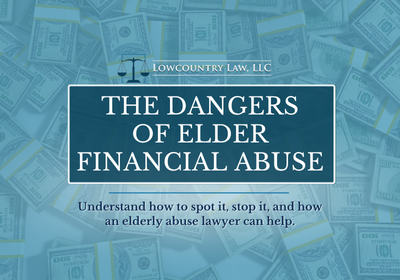Our golden years should be a time of connection, comfort, and security. But for many, they come with serious risks. Elders, especially those in nursing homes, can become targets of financial abuse by both strangers and trusted individuals who exploit things such as cognitive decline or lack of oversight. In South Carolina, financial elder abuse in nursing homes is a widespread and deeply underreported problem. According to a national study in 2022, South Carolina ranks third-worst in the nation for protecting elders from abuse. This alarming statistic highlights the urgent need to recognize and stop abuse before irreversible harm is done. It also underscores the role of a dedicated elderly abuse lawyer like Matthew Breen in protecting vulnerable seniors and holding abusers accountable.
Common Forms and Perpetrators of Financial Abuse
 Financial exploitation in nursing homes often involves the illegal use of a resident’s money, property, or legal rights, such as draining bank accounts or pressuring them to sign over assets. Unlike physical abuse, financial exploitation often goes undetected until major harm is done.
Financial exploitation in nursing homes often involves the illegal use of a resident’s money, property, or legal rights, such as draining bank accounts or pressuring them to sign over assets. Unlike physical abuse, financial exploitation often goes undetected until major harm is done.
Perpetrators are rarely strangers. In most reported cases, the abuse is committed by someone the resident knows and trusts, such as staff, caregivers, administrators, or even family. Unfortunately, financial abuse is often undiscovered until a loved one notices missing funds, irregular withdrawals, or suspicious changes to legal documents.
Elderly Abuse Lawyer Explains Causes and Risk Factors
Nursing home residents in South Carolina face a unique set of circumstances that leave them exposed to financial abuse, with several related factors increasing the likelihood of exploitation.
Cognitive Decline
Many elders suffer from dementia, Alzheimer’s, or other memory issues that make it hard to manage finances or recognize abuse. Even mentally sharp residents can become confused during illness or while on medications that affect judgment.
Social Isolation
Isolation is a major risk factor. Nursing home residents who lack regular visitors are more likely to be targeted for abuse. Abusers, whether staff or family, often feel encouraged when they believe no one is watching. Without consistent oversight or involvement from loved ones, there’s less chance someone will question suspicious behavior.
Dependency on Caregivers
Residents depend on staff for medical care, hygiene, meals, and emotional support. This imbalance of power creates opportunities for abuse. A caregiver who controls access to food, medicine, or privileges can pressure a vulnerable elder into giving up money or assets out of fear or confusion.
Lack of Financial Oversight
Elders often give a trusted person control over their finances through a power of attorney or guardianship. But this legal authority doesn’t guarantee honest behavior. South Carolina lacks effective enforcement to monitor individuals in financial roles, allowing abuse to go unchecked.
Systemic Failures in Oversight
Despite existing laws, enforcement of oversight remains inadequate. South Carolina nursing homes are rarely audited for financial irregularities, and staff are not consistently trained to detect red flags. Without mandatory financial oversight or routine audits, staff and even visitors may exploit residents without consequences.
Additionally, these risk factors often overlap with one another. A resident with memory loss, no family support, and full dependence on staff is especially vulnerable to exploitation. Without legal intervention, the damage can be severe and irreversible.
South Carolina’s Legal Protections and Enforcement From an Elderly Abuse Lawyer
South Carolina law defines financial exploitation as the improper use of a vulnerable adult’s money or assets for personal gain, through theft, deception, or withholding funds.
The South Carolina Omnibus Adult Protection Act gives older adults the legal right to manage their own finances privately, unless a court has determined they are legally incompetent. Furthermore, South Carolina recently enacted Bill 3617, enabling seniors the right to name trusted individuals who will be notified about signs of financial exploitation. This bill gives families an opportunity to intervene before significant harm is done.
Victims of financial elder abuse and their families can take action by:
- Filing a report with Adult Protective Services (APS)
- Initiating a civil lawsuit to recover stolen assets or secure compensation
- Requesting a criminal investigation through local law enforcement
- Reporting the nursing home to the South Carolina Department of Public Health (DPH)
While vital to your claim, these processes are complex. Documentation, timelines, and legal filings must be handled with care and precision. This is where an experienced nursing home abuse lawyer comes in.
Contact an Elderly Abuse Lawyer Now to Protect Your Loved One
Attorney Matthew Breen of Lowcountry Law, LLC, is a trusted advocate for victims of elder abuse in South Carolina. He uses swift action and focused investigation to uncover financial exploitation and hold abusers accountable.
Don’t wait to take action against financial exploitation. Early action can mean the difference between recovery and permanent loss. Contact Attorney Matthew Breen today to schedule a free consultation. He will fight to protect their rights and seek the compensation they deserve.



